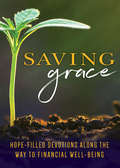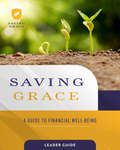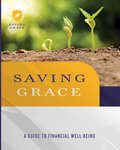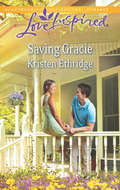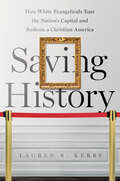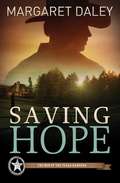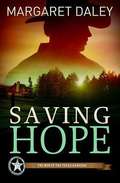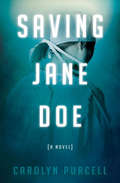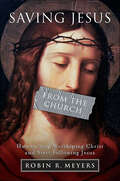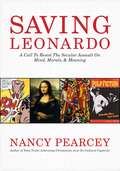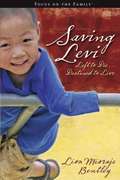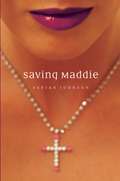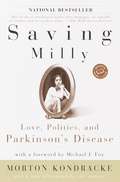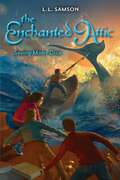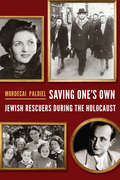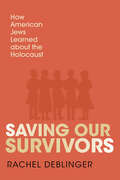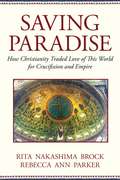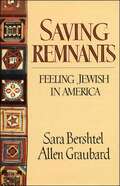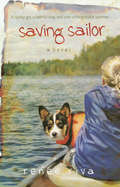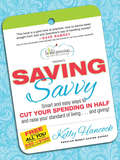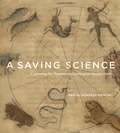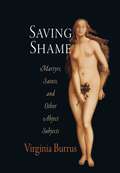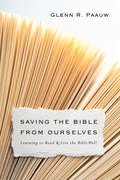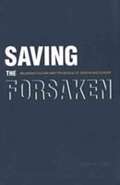- Table View
- List View
Saving Grace Devotional: Hope-Filled Devotions Along the Way to Financial Well-Being (Saving Grace)
by AbingdonSaving Grace: A Guide to Financial Health is a program to help people of faith create healthy relationships with money and possessions. Participants will move through six sessions covering such topics as saving, earning, giving, spending, and debt, along with helpful strategies for achieving a sustainable financial life. Adapted from the best-selling Freed Up Financial Living from the Good Sense Movement, this study is based on Wesleyan values and provides text and tools to help participants address life concerns and reach personal financial goals. A 40-day devotional offers spiritual support for a new approach to financial health. The short devotional essays bring reassurance, encouragement, faith, and prayer to complement the work of finding strength in faith to make life changes.
Saving Grace Leader Guide: A Guide to Financial Well-Being (Saving Grace)
by AbingdonSaving Grace: A Guide to Financial Health is a program to help people of faith create healthy relationships with money and possessions. Participants will move through six sessions covering such topics as saving, earning, giving, spending, and debt, along with helpful strategies for achieving a sustainable financial life. Adapted from the best-selling Freed Up Financial Living from the Good Sense Movement, this study is based on Wesleyan values and provides text and tools to help participants address life concerns and reach personal financial goals. The Leader Guide contains session plans, outlines, discussion questions, and everything needed to guide a six-week group study on a faithful approach to financial health.
Saving Grace Participant Workbook: A Guide to Financial Well-Being (Saving Grace)
by AbingdonSaving Grace: A Guide to Financial Health is a program to help people of faith create healthy relationships with money and possessions. Participants will move through six sessions covering such topics as saving, earning, giving, spending, and debt, along with helpful strategies for achieving a sustainable financial life. Adapted from the best-selling Freed Up Financial Living from the Good Sense Movement, this study is based on Wesleyan values and provides text and tools to help participants address life concerns and reach personal financial goals. Additional components for a six-week study include a DVD, Clergy Workbook, Leader Guide, and a 40-day devotional.
Saving Gracie
by Kristen EthridgeRunning an ESL school is hard work, but helping immigrants has always been a dream of Gracie Garcia's. When her school is threatened by real-estate developer Jake Peoples, Gracie hopes that getting him to attend a class will change his mind. But a lesson in love was something neither one signed up for. Learning about Gracie's work reminds Jake what family is really about. But just as he's starting to come around, a revelation about his past threatens his future with Gracie. When things look their bleakest, can Jake save her dream...and his place in her heart?
Saving History: How White Evangelicals Tour the Nation's Capital and Redeem a Christian America (Where Religion Lives)
by Lauren R. KerbyMillions of tourists visit Washington, D.C., every year, but for some the experience is about much more than sightseeing. Lauren R. Kerby's lively book takes readers onto tour buses and explores the world of Christian heritage tourism. These expeditions visit the same attractions as their secular counterparts—Capitol Hill, the Washington Monument, the war memorials, and much more—but the white evangelicals who flock to the tours are searching for evidence that America was founded as a Christian nation. The tours preach a historical jeremiad that resonates far beyond Washington. White evangelicals across the United States tell stories of the nation's Christian origins, its subsequent fall into moral and spiritual corruption, and its need for repentance and return to founding principles. This vision of American history, Kerby finds, is white evangelicals' most powerful political resource—it allows them to shapeshift between the roles of faithful patriots and persecuted outsiders. In an era when white evangelicals' political commitments baffle many observers, this book offers a key for understanding how they continually reimagine the American story and their own place in it.
Saving Hope
by Margaret DaleyWhen a teenager goes missing from the Beacon of Hope School, Texas Ranger Wyatt Sheridan and school director Kate Winslow are forced into a dangerous struggle against a human trafficking organization. But the battle brings dire consequences as Wyatt's daughter is terrorized and Kate is kidnapped. Now it's personal, and Wyatt finds both his faith and investigative skills challenged as he fights to discover the mastermind behind the ring before evil destroys everyone he loves.
Saving Hope
by Margaret DaleyWhen a teenager goes missing from the Beacon of Hope School, Texas Ranger Wyatt Sheridan and school director Kate Winslow are forced into a dangerous struggle against a human trafficking organization. But the battle brings dire consequences as Wyatt's daughter is terrorized and Kate is kidnapped. Now it's personal, and Wyatt finds both his faith and investigative skills challenged as he fights to discover the mastermind behind the ring before evil destroys everyone he loves. "Through crisp writing, Daley paints life-like characters engaged in a believable struggle that kept me turning pages to the satisfying ending." -- Richard L. Mabry, MD, Author of Lethal Remedy and the Prescription For Trouble series "Fan favorite Margaret Daley wows readers with Saving Hope, her new release in the Men of the Texas Rangers series. Intense, gritty, exciting, and with a compelling love story...this book has everything a romantic suspense reader could want!" Marta Perry, Vanish in Plain Sight, HQN Books "Saving Hope is a story straight from the headlines. Missing teens, a Texas Ranger Dad, and a woman who just wants to make a difference in the lives of the girls she loves, all come together in an explosive story that will make you turn the pages as fast as possible to get to the end--which has a nice twist that you won't see coming. Just make sure you have plenty of time to read because you WON'T want to put this one down. A fabulous romantic suspense." -- Lynette Eason, best-selling, award-winning author of the Women of Justice Series. "Margaret Daley's Saving Hope is a beautifully told story of second chances with very real characters who stayed with me long after I finished the book. I'll be looking for more Texas Rangers stories from her!"~Robin Caroll, author of the Evil series and the Justice Seekers series
Saving Jane Doe: A Novel
by Carolyn PurcellAn unplanned pregnancy triggers a woman&’s emotional journey in this &“intense&” and inspiring novel of healing and forgiveness (Lexington Herald Leader). At a seedy Lexington motel, a &“Jane Doe&” has been found unconscious, suffering from amnesia, and clinging to life after getting an illegal abortion. To Dr. Cara Land, third-year medical student at University of Kentucky Hospital, the patient has also become a friend she&’s desperate to help. When she discovers the woman&’s name is Jessica, it&’s the first step in her search for a vanished life. Now that Cara&’s compassionate Uncle Henry hires her a live-in housekeeper, the penniless Jessica—once adrift—has a tenuous hope for the future. However, as Jessica&’s past slowly comes into focus so do the memories of all she left behind—the husband and children she abandoned, the guilt and shame she&’s been trying to outrun, and the fear that there&’s no going back. But Jessica has a lot to discover about herself, those she loves, and the power of faith, family and forgiveness.
Saving Jesus from the Church: How to Stop Worshiping Christ and Start Following Jesus
by Robin R. Meyers“With crisply prophetic joy, Meyers calls seekers and believers alike to leave belief about God behind in favor of becoming imitators of Jesus.” —Diana Butler Bass, author of A People’s History of ChristianityRobin Meyers, a rising star of liberal Christianity, restores the true mission of the faith that captures the heart of Jesus’s concern for people over “right belief.” Saving Jesus from the Church will resonate deeply with those who enjoy the works of John Shelby Spong, Marcus Borg, and John Dominic Crossan.“In a progressive rather than negatively critical mode, in strong contrast to much of Far Right Protestantism, pastor/NPR commentator Meyers suggests with typical elegance that a recovery of true Christianity emphasizes compassion over condemnation, blessing over sin, and equity over individual prosperity. Highly recommended.” —Library Journal (starred review)“Scholarly, pastoral, prophetic, and eloquent. The invitation to follow Jesus instead of worshiping Christ could not come at a more important time, or be issued by a more credible source.” —Desmond Tutu“Robin Meyers emerges in Saving Jesus from the Church as a national voice for a new Christianity. He is a well read scholar and a superb communicator. He writes with a refreshing honesty and a disarming authority. This book is a treat.” —John Shelby Spong, author of Rescuing the Bible from Fundamentalism“Meyers’ insightful and provocative critique of contemporary Christianity will stimulate energetic theologizing: deconstruction, reconstruction, or impassioned defense of the inherited tradition. Thank you, Robin, for convening this urgently needed conversation.” —Dr. James A. Forbes, Jr., president and founder of The Healing of the Nations Foundation
Saving Leonardo
by Nancy PearceyIs secularism a positive force in the modern world? Or does it lead to fragmentation and disintegration? In Saving Leonardo, best-selling award-winning author Nancy Pearcey (Total Truth, coauthor How Now Shall We Live?) makes a compelling case that secularism is destructive and dehumanizing. Pearcey depicts the revolutionary thinkers and artists, the ideas and events, leading step by step to the unleashing of secular worldviews that undermine human dignity and liberty. She crafts a fresh approach that exposes the real-world impact of ideas in philosophy, science, art, literature, and film--voices that surround us in the classroom, in the movie theater, and in our living rooms. A former agnostic, Pearcey offers a persuasive case for historic Christianity as a holistic and humane alternative. She equips readers to counter the life-denying worldviews that are radically restructuring society and pervading our daily lives. Whether you are a devoted Christian, determined secularist, or don''t know quite where you stand, reading Saving Leonardo will unsettle established views and topple ideological idols. Includes more than 100 art reproductions and illustrations that bring the book''s themes to life.
Saving Levi: Left to Die, Destined to Live
by Lisa Misraje BentleyA baby boy is found in a field in China. He has been burned over most of his body and left to die in is burial clothes. This is the story of an American famly running an orphanage for Chinese special-needs children. They recover the child from a chinese man. The Americans save him first in hospitals in China and then, through help from all over the world and their belief in God, bring the baby to the U.S. for treatment.
Saving Maddie
by Varian JohnsonJoshua Wynn is a preacher’s son and a “good boy” who always does the right thing. Until Maddie comes back to town. Maddie is the daughter of the former associate pastor of Joshua’s church, and his childhood crush. Now Maddie is all grown up, gorgeous—and troubled. She wears provocative clothes to church, cusses, drinks, and fools around with older men. Joshua’s ears burn just listening to the things she did to get kicked out of boarding school, and her own home. As time goes on, Josh goes against his parents and his own better instincts to keep Maddie from completely capsizing. Along the way, he begins to question his own rigid understanding of God and whether, as his mother says, a girl like Maddie is beyond redemption. Maddie leads Josh further astray than any girl ever has . . . but is there a way to reconcile his love for her and his love for his life in the church? From the Hardcover edition.
Saving Milly: Love, Politics, and Parkinson's Disease
by Morton KondrackeFrom the book: "Deeply affecting . . . Unforgettable . . . Kondracke seems to be a natural truth-teller, and the directness of his narrative, its demotic lack of interest in irony when confronted with the rudimentary facts of mortal illness, opens his reader's heart and engages his reader's mind." -The New Republic "This is Morton Kondracke's account of his wife's battle with Parkinson's disease and his own transformation from a self-described careerist with more drive than talent to a mensch who has achieved greatness in this one book alone. I finished it last night in tears." -RICHARD COHEN, The Washington Post "Morton's love for Milly has been unfailingly strong and steadfast ... in sickness and in health. His fierce devotion has inspired him to move mountains, and move scientists closer than ever to finding a cure for this cruel disease. We all must join together to fight for more money so we can save our most precious resource-the lives of those we love." -KATIE COURIC
Saving Moby Dick (The Enchanted Attic)
by L. L. SamsonThis Character Could Be One Whale of a Problem In Saving Moby Dick, Linus, Ophelia, and their friend Walter think they can control the powers of the Enchanted Attic, and they plan to bring Captain Ahab from Book World into Real World—on their own terms. But even the best-laid plans go awry sometimes, and their adventures take a wild turn. Captain Ahab is far crazier than they realized, and bookstores aren’t really the best places to find whales, white or otherwise.
Saving One's Own: Jewish Rescuers during the Holocaust
by Mordecai PaldielIn this remarkable, historically significant book, Mordecai Paldiel recounts in vivid detail the many ways in which, at great risk to their own lives, Jews rescued other Jews during the Holocaust. In so doing he puts to rest the widely held belief that all Jews in Nazi-dominated Europe wore blinders and allowed themselves to be led like “lambs to the slaughter.” Paldiel documents how brave Jewish men and women saved thousands of their fellow Jews through efforts unprecedented in Jewish history. Encyclopedic in scope and organized by country, Saving One’s Own tells the stories of hundreds of Jewish activists who created rescue networks, escape routes, safe havens, and partisan fighting groups to save beleaguered Jewish men, women, and children from the Nazis. The rescuers’ dramatic stories are often shared in their own words, and Paldiel provides extensive historical background and documentation. The untold story of these Jewish heroes, who displayed inventiveness and courage in outwitting the enemy—and in saving literally thousands of Jews—is finally revealed.
Saving Our Survivors: How American Jews Learned about the Holocaust (The Modern Jewish Experience)
by Rachel DeblingerHow did American Jews come to learn about the Holocaust in the immediate aftermath of the war? What kinds of images and representations of Holocaust survivors first circulated in America, when most Jewish survivors were still stuck in European displaced persons camps? Drawing on communal records and previously unexamined cultural materials, Saving Our Survivors details the kinds of narratives that inspired American Jewish action in the wake of the Holocaust and argues that American Jewish communal life became a significant site of knowledge formation and dissemination about the Holocaust. Through organizational campaign materials, public speeches, appeal letters, brochures, posters, radio broadcasts, and short films, American Jews were compelled to act as heroes, saving Jewish lives and a Jewish future. Bringing postwar communal narratives into the longer history of Holocaust memory in America challenges our understanding of what Holocaust narratives look and sound like and invites us to consider the relationship between humanitarian aid and the narratives they employ to inspire action. By expanding our understanding of how stories about the Holocaust became part of an American discourse and considering multiple forms of Holocaust survivor accounts, Saving Our Survivors highlights the messy, diffuse, and contested nature of memory construction in the immediate aftermath of the Holocaust, as well as each new tragedy we confront.
Saving Paradise: How Christianity Traded Love of This World for Crucifixion and Empire
by Rita Nakashima Brock Rebecca Ann ParkerOne of Publishers Weekly's Best Books of 2008. During their first millennium, Christians filled their sanctuaries with images of Christ as a living presence--as a shepherd, teacher, healer, or an enthroned god. He is serene and surrounded by lush scenes, depictions of this world as paradise. Yet once he appeared as crucified, dying was virtually all Jesus seemed able to do, and paradise disappeared from the earth. Saving Paradise turns a fascinating new lens on Christianity, from its first centuries to the present day, asking how its early vision of beauty evolved into a vision of torture, and what changes in society and theology marked that evolution. It also retrieves, for today, a life-affirming Christianity that the world sorely needs.
Saving Remnants: Feeling Jewish in America
by Sara Bershtel Allen GraubardInterviews with American Jews of the postwar generation offer an overview of what ethnicity and faith have come to mean, and explore the conflict between traditional group loyalties and secular society
Saving Sailor
by Renee RivaThe year is 1968. After spending the first half of summer vacation driving her Italian family crazy with her fake southern accent, 10-year old A.J. finds a soul mate on the other side of the island to divert her attention. She is intrigued to learn that Danny shares her same burning desire to know God and realizes that few people her age think as deeply as the two of them do. However, the depth of their newfound faith and friendship is soon tested when Danny's father betrays his wife.Set in a simpler time, Saving Sailor is a heartwarming tale of how hearts can change and relationships can be restored with God's help.
Saving Savvy: Smart and Easy Ways to Cut Your Spending in Half and Raise Your Standard of Living...and Giving!
by Kelly HancockEverybody wants to save money, but sometimes it's just too difficult and overwhelming. Kelly Hancock, popular blogger and media personality, has done the hard work for those who want to save big! Her saving secrets will help readers cut their spending half - even before they clip the first coupon. Kelly was a successful business professional who abruptly changed her mind to stay home after the birth of her first child. But it didn't make financial sense on paper. So Kelly figured out a way to cut family's overall spending substantially and their grocery budget by 80%. They not only discovered how to make ends meet, they were able to give more generously to others. She reassures readers that God will faithfully provide for those who seek to honor.
A Saving Science: Capturing the Heavens in Carolingian Manuscripts
by Eric M. Ramírez-WeaverIn A Saving Science, Eric Ramírez-Weaver explores the significance of early medieval astronomy in the Frankish empire, using as his lens an astronomical masterpiece, the deluxe manuscript of the Handbook of 809, painted in roughly 830 for Bishop Drogo of Metz, one of Charlemagne’s sons. Created in an age in which careful study of the heavens served a liturgical purpose—to reckon Christian feast days and seasons accurately and thus reflect a “heavenly” order—the diagrams of celestial bodies in the Handbook of 809 are extraordinary signifiers of the intersection of Christian art and classical astronomy.Ramírez-Weaver shows how, by studying this lavishly painted and carefully executed manuscript, we gain a unique understanding of early medieval astronomy and its cultural significance. In a time when the Frankish church sought to renew society through education, the Handbook of 809 presented a model in which study aided the spiritual reform of the cleric’s soul, and, by extension, enabled the spiritual care of his community. An exciting new interpretation of Frankish painting, A Saving Science shows that constellations in books such as Drogo’s were not simple copies for posterity’s sake, but functional tools in the service of the rejuvenation of a creative Carolingian culture.
A Saving Science: Capturing the Heavens in Carolingian Manuscripts
by Eric M. Ramírez-WeaverIn A Saving Science, Eric Ramírez-Weaver explores the significance of early medieval astronomy in the Frankish empire, using as his lens an astronomical masterpiece, the deluxe manuscript of the Handbook of 809, painted in roughly 830 for Bishop Drogo of Metz, one of Charlemagne’s sons. Created in an age in which careful study of the heavens served a liturgical purpose—to reckon Christian feast days and seasons accurately and thus reflect a “heavenly” order—the diagrams of celestial bodies in the Handbook of 809 are extraordinary signifiers of the intersection of Christian art and classical astronomy.Ramírez-Weaver shows how, by studying this lavishly painted and carefully executed manuscript, we gain a unique understanding of early medieval astronomy and its cultural significance. In a time when the Frankish church sought to renew society through education, the Handbook of 809 presented a model in which study aided the spiritual reform of the cleric’s soul, and, by extension, enabled the spiritual care of his community. An exciting new interpretation of Frankish painting, A Saving Science shows that constellations in books such as Drogo’s were not simple copies for posterity’s sake, but functional tools in the service of the rejuvenation of a creative Carolingian culture.
Saving Shame
by Virginia BurrusVirginia Burrus explores one of the strongest and most disturbing aspects of the Christian tradition, its excessive preoccupation with shame. While Christianity has frequently been implicated in the conversion of ancient Mediterranean cultures from shame- to guilt-based, and thus in the emergence of the modern West's emphasis on guilt, Burrus seeks to recuperate the importance of shame for Christian culture. Focusing on late antiquity, she explores a range of fascinating phenomena, from the flamboyant performances of martyrs to the imagined abjection of Christ, from the self-humiliating disciplines of ascetics to the intimate disclosures of Augustine.Burrus argues that Christianity innovated less by replacing shame with guilt than by embracing shame. Indeed, the ancient Christians sacrificed honor but laid claim to their own shame with great energy, at once intensifying and transforming it. Public spectacles of martyrdom became the most visible means through which vulnerability to shame was converted into a defiant witness of identity; this was also where the sacrificial death of the self exemplified by Christ's crucifixion was most explicitly appropriated by his followers. Shame showed a more private face as well, as Burrus demonstrates. The ambivalent lure of fleshly corruptibility was explored in the theological imaginary of incarnational Christology. It was further embodied in the transgressive disciplines of saints who plumbed the depths of humiliation. Eventually, with the advent of literary and monastic confessional practices, the shame of sin's inexhaustibility made itself heard in the revelations of testimonial discourse.In conversation with an eclectic constellation of theorists, Burrus interweaves her historical argument with theological, psychological, and ethical reflections. She proposes, finally, that early Christian texts may have much to teach us about the secrets of shame that lie at the heart of our capacity for humility, courage, and transformative love.
Saving the Bible from Ourselves: Learning to Read and Live the Bible Well
by Glenn R. PaauwECPA 2017 Christian Book Award Finalist Does the Bible need to be saved? Over the course of the centuries, Bible scholars and publishers have increasingly added "helps"—chapter divisions, verses, subheads, notes—to the Bible in an effort to make it easier to study and understand. In the process, however, these have led to sampling Scripture rather than reading deeply. According to author Glenn R. Paauw, the text has become divorced from the Bible's literary and historical context, leading to misinterpretation and a "narrow, individualistic and escapist view of salvation." Rather than being a culture-shaping force, the Bible has become a database of quick and easy answers to life's troubling questions. But these deficiencies can be corrected by engaging in what the author calls "big readings." In these pages Paauw introduces us to seven new (to us) understandings of the Bible as steps on the path to recovering one deeply engaged Bible. With each "new" Bible presented, deficiencies in how we currently interact with the Bible are explored, followed by recommendations for a new practice. The Bible's transformative power is recovered when we remove the chains Christians have applied to it over the centuries. The Bible does not need to be saved because of any defect in itself, but because we have distorted and misread it. Saving the Bible from Ourselves provides students of the Bible a new paradigm for reading and living the Bible well.
Saving the Forsaken: Religious Culture and the Rescue of Jews in Nazi Europe
by Pearl M. OlinerPearl M. Oliner examines data on Christian rescuers and nonrescuers of Jews during the Holocaust to shed light on these important questions. Drawing on interviews with more than five hundred Christians--Protestant and Catholic, very religious, irreligious, and moderately religious--rescuers and nonrescuers living in Nazi-occupied Europe, Oliner offers a sociological perspective on the values and attitudes that distinguished each group. She presents several case studies of rescuers and nonrescuers within each group and then interprets the individual's behavior as it relates to his or her group. She finds that the value patterns of the religious groups differ significantly from one another, and she is able to highlight those factors that appear to have contributed most toward rescue within each group.
